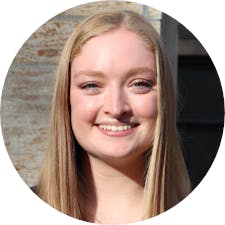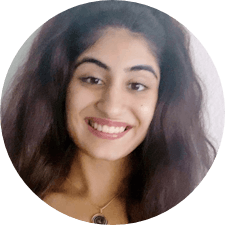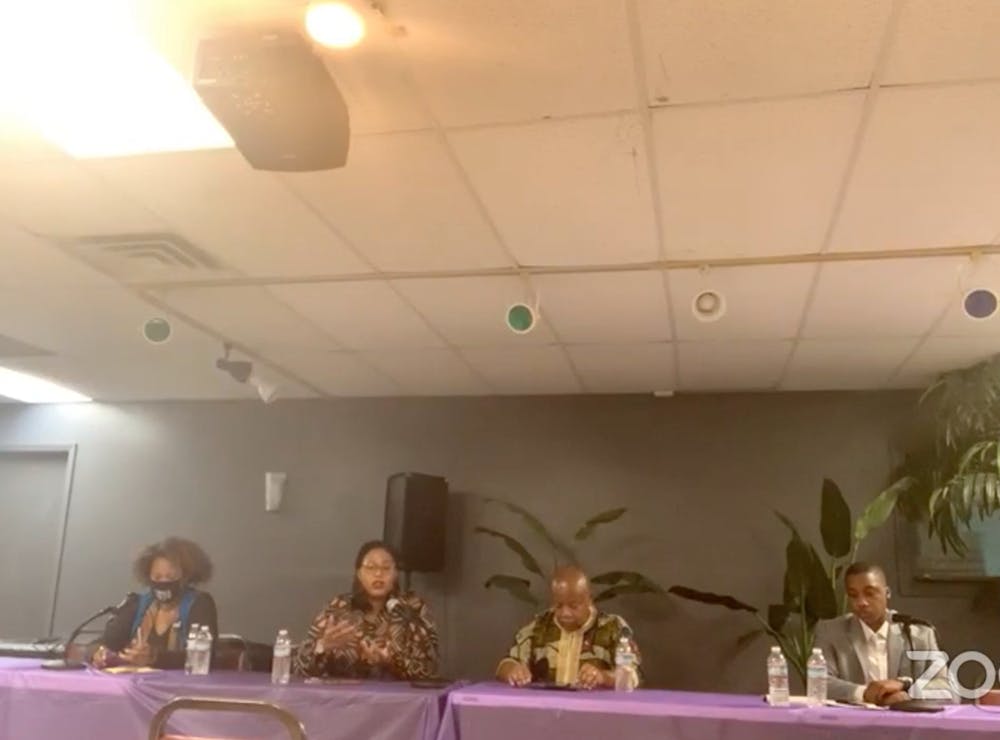Durham mayoral and city council candidates discussed their visions for their positions as well as topics such as vaccine mandates and income inequality at Tuesday's Meet the Candidates Forum.
The panelists present were mayoral candidate Elaine O’Neal; Ward I candidates DeDreana Freeman and Marion T. Johnson; and Ward II candidate Sylvester Wiliams, who each advanced in the Oct. 5 primary election. They were joined by Ward III candidates AJ Williams and Leonardo Williams, who progressed directly to the general election.
Overall visions
O’Neal’s vision for the future of Durham includes stabilizing the lives of the homeless and “creat[ing] pathways for young people.” She hopes to recruit people within the city to help make this change happen.
“My vision for Durham is that we thrive. Not just survive. We thrive,” O’Neal said. “We’re going to need volunteers to help us solve these problems. We’re going to go into our communities and rebuild.”
Johnson juxtaposed a “status quo” Durham with an equity-centered Durham that is “accessible, affordable and livable for all” while describing her vision for the city.
“We are disconnected from jobs, we are disconnected from housing … When we have people like Google, when we have people like Apple coming in, that puts pressure on our housing supply. That puts pressure on job supply,” Johnson said.
AJ Williams hopes to bring forth his vision for a future Durham by “[addressing] the root causes that cause people to pick up guns.”
“I’ve been here for three decades. I’ve been here when Durham had a gang problem. I’ve been here for all of that,” Williams said. “What I’m proposing is we start addressing those root causes like mental illness that’s going untreated, like poverty, like housing instability, like substance addiction.”
Gay marriage
The candidates were asked how they feel about “the marriage between male and female, what scripture says and what the African-American community’s been standing on for over 200-and-some years.”
Sylvester Williams said that “there are no multisexes.” O’Neal disagreed.
“I’ve been married twice, not successfully. So who am I to talk about someone else who’s married successfully, not to a man?” O’Neal said.
Johnson stated that she has been married to a woman for the past six years and feels the African American community “has been respectful” of her marriage.
Community relationships
Later in the meeting, an audience member asked the candidates how they would bring hope to a community in need of it.
AJ Williams responded that “[the government] should be a formal resource in our community. So, when I get on this council, I want us to have that dialogue again.” His response was met with applause from the audience.
Johnson believes the fastest way to kill hope is to “stop listening and for people to feel like, ‘well why should I even talk to my city council, why should I even talk to anybody in government, they don't listen.’”
“I've heard that so many times when I've been knocking on doors. I've had a number of their Durham residents say, ‘you're the first candidate who's ever knocked on my door before,’” Johnson said. “That's the sort of disconnect that people have between not seeing themselves represented and not feeling listened to.”
Johnson said that representatives should make themselves “as accessible as possible” to their constituents and be there for them in whatever capacity they need. Constituents should know that “even if I as an individual can't solve it, I can walk along beside you, as we're trying to solve it together,” Johnson said.
Get The Chronicle straight to your inbox
Sign up for our weekly newsletter. Cancel at any time.
Sylvester Williams added that, “[he] will not overlook anyone.”
Diversity and inequality
The candidates went on to discuss diversity, income inequality and vocational education in Durham.
Freeman highlighted the importance of “making sure that the directors of organizations understand how diversity works, and then also noting that they can have their employers of color that aren’t just working in the labor.”
Johnson pointed out that the housing wage in Durham is $22 per hour, greater than both the living wage and minimum wage.
“We're still advocating for something that's not allowing people to make ends meet,” she said. “Everybody needs to have a system that connects them to the skills that they need.”
In addition, Johnson expressed support for national reparations to close the racial wealth gap and “acknowledge the harm the extraction of labor of wealth has been taken from African-American descendants of slaves.”
Sylvester Williams recalled the vast vocational programs offered when he was in school and affirmed his commitment to collaborating with the Durham County government to “bring back vocational classes” to the school system.
AJ Williams expressed support for a city initiative that would fund zero-cost trade program certifications for technical jobs.
Mandating vaccines
The candidates had passionate responses to being asked about their views on mandatory vaccines.
Sylvester Williams claimed that “drug companies are in the business of making money,” citing numerous medicines that have been taken off the market.
“We’ve been duped into believing once again,” he said.
AJ Williams responded, “I want to acknowledge, first and foremost, inequities in the medical industry” that caused many Black people to distrust the medical industry.
Leonardo Williams got vaccinated after speaking with a family friend from Zimbabwe, who is a scientist working to expand access to the vaccine.
“I wish that my community had access to the same information that I did to gain the confidence,” he said.
Freeman responded, “vaccines have been provided to make sure that we essentially slow down the spread.” She also discussed the equity concerns surrounding education and distribution of the vaccine.
“I do believe that we as Black people have a very well founded distrust of the medical community based on the history of exploitation, of use, of ignorance,” Johnson said.
Johnson shared that she lost a friend to COVID-19 last year after the friend was turned away from the hospital twice; the friend was told she was having a panic attack.
Regarding vaccination access, Johnson said, “it's important for us to look at who has gotten vaccinated, who is sort of cheating the system so that they could get vaccines.”
“It was rich white people who tried to get these vaccines,” she said, noting that members of Congress,President Joe Biden and former President Donald Trump have gotten vaccinated. “So if you look at that, it's easy for you to see that this vaccine is not them trying to experiment on us anyways. It is to prevent the spread of an incredibly dangerous disease.”
Conflicts of interest
When asked about outside engagements that might impose on their duties as members of city government, Freeman responded firmly, “I have no entanglements.”
Freeman addressed her previous position as the campaign manager for Durham mayor pro tempore Jillian Johnson and clarified that “I am not accountable to her more than I am to the City of Durham.”
Sylvester Williams said, “I am entangled with the people. That’s the reason I am running.”
Supporting asylum seekers
One audience member asked the candidates how they plan to support asylum seekers given the significant refugee population in Durham.
“Residency is more important than citizenship for me,” Freeman said. She said that every resident should feel safe and secure in Durham.
Johnson committed to walking in solidarity with immigrants.
“I believe that Black immigrants in particular get left out of a lot of conversations about immigration policy, but we do tend to be the ones who are most vulnerable to policing for instance, to [U.S. Immigration and Customs Enforcement] raids,” she said. “If we encounter police, we are more likely to be arrested and deported.”
AJ Williams said that “global imperialism affects all people across the world” and hopes Durham is a “city that welcomes everyone.”
Leonardo Williams shared that his wife was naturalized in 2016, and has since opened Zweli’s, the nation's first Zimbabwean restaurant, which has multiple locations in Durham, including at Duke.
Many of the candidates asked audience members and other members of city government to hold them accountable for their actions towards immigrant communities in Durham.
Closing statements
In her closing statement, Johnson said, “I'm running because I believe in an equitable Durham; I believe in a Durham that is accessible, affordable and I believe that the status quo is going to keep on reinforcing prosperity, abundance, or comfort for a few people."
Johnson expressed the need Io dismantle systems that reinforce white supremacy and the patriarchy and instead "create systems that actually uplift all of us that support all of us that empower all of us.”
“I'm less concerned with what I want to be in Durham,” Johnson said, “I'm more concerned with what I want to do in Durham.”
“I would love to create conditions where every last one of our residents is safe, taken care of, and protected,” AJ Williams said in his closing statement.
With respect to civic engagement, AJ Williams said, “I know what can happen when enough people are mad about a thing and we come together and decide to do something different… I'm planning on the fact that we can get together, creating creative solutions to public safety, but also creating the future that we actually want to see for our children, for our children's children.”
Freeman learned that leadership is about relationships, she said in her statement.
“The beautiful thing about running for this seat is I don’t have to make anything up,” Leonardo Williams said in his closing statement. “I don’t have to create an alternative personality.”

Kathryn Thomas is a Trinity junior and new reporter coordinator of The Chronicle's 119th volume. She was previously news editor for Volume 118.

Ayra Charania is a Trinity junior and a senior editor of The Chronicle's 118th volume.

